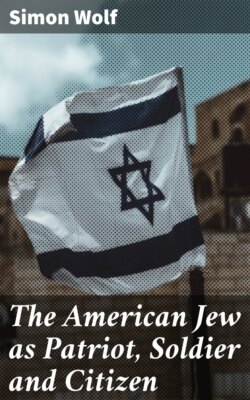Читать книгу The American Jew as Patriot, Soldier and Citizen - Simon Wolf - Страница 18
На сайте Литреса книга снята с продажи.
Оглавление"Samuel Noah.
"Class of 1807.
"Died March 10, 1871, at Mount Pulaski, Ill., aged 92.
"Samuel Noah, who was born July 19, 1779, in the City of London, died March 10, 1871, at Mount Pulaski, Logan county, Illinois, at the advanced age of nearly 92, he having been for several years the senior surviving graduate of the United States Military Academy. He was of Jewish descent, and was a cousin of Mordecai M. Noah, formerly consul to Tunis, and for many years the editor of various New York journals.
"When twenty years old he emigrated to this country, and after a residence of several years in New York City, solicited a midshipman's appointment, but not succeeding, accepted, May 5, 1805, that of a cadet in the First Regiment of Artillery. Being intelligent and a good penman, he was often selected as amanuensis to the Superintendent of the Military Academy, and frequently acted as Judge Advocate or Recorder of Courts at West Point. Upon graduation, Dec. 9, 1807, preferring the Infantry arm, he was promoted an ensign in the Second Regiment, which, after a tedious journey, he joined at Cantonment, Columbia Springs, in the rear of Fort Adams, Miss. Here he devoted his leisure hours to the study of the early campaigns of Napoleon, who was then the military prodigy of the world; but this fascinating occupation was soon interrupted by his having to watch smugglers on the Florida frontier and march from one unhealthy camp to another in the Gulf States. During these migrations he met Captain Winfield Scott just after his duel near Natchez with Dr. Upshur (brother of the Secretary of State blown up on board the Princeton), Lieutenant James Gibson, subsequently killed at the sortie from Fort Erie, Gen. James Wilkinson, Captain Edmond P. Gaines, Gen. Wade Hampton, and other since famous officers of whom he had many anecdotes to relate. Wearied finally with slow promotion, and disgusted that ignorant civilians were appointed to rank him, he resigned March 13, 1811, his commission of First Lieutenant in the Army.
"Soon after this period a Mexican deputation from the Junta of Coahuila, Gen. Bernado Guiteras and Captain Manscac arrived at Natchitoches, where Lieutenant Magee, a graduate of 1809, was stationed, and offered him the command with the rank of Colonel of the combined forces there assembled of Mexicans and Anglo-Americans. After Magee assumed the command, Noah, allured by visions of a golden future, joined, as First Lieutenant, this little undisciplined Falstaffian regiment on the Brazos river, while on its march to Fort Bahia, which it entered Nov. 14, 1812; but no sooner was the fort in possession of the Patriot Army than the Spanish royalists besieged it with a force of five times the strength of the garrison. In this struggle poor Col. Magee sickened and died, and was buried with the honors of war during the enemy's cannonade, a six-pounder ball lodging close to the grave. After the siege was raised, March 28, 1813, and the patriots reinforced, this little army, with Noah in command of its rear guard, pursued and routed the Royalists, April 4, 1813, in a sharp combat near San Antonio, and three days later entered the capital of Texas, Salcido, the governor, surrendering at discretion with his entire force.
"Informed soon after of the declaration of war by the United States against Great Britain, Noah, true to the flag of his adopted country, left Texas, and, escaping through many perils by flood and field, reached the city of Washington, where he was most sadly disappointed in not being re-commissioned by President Madison in the United States Army. Nothing daunted, however, he proceeded to New York, and volunteered his services as a private soldier with Captain Benjamin Dunning's company for the defence of Brooklyn, then being fortified by Gen. Joseph G. Swift, to repel an anticipated descent of the British on Long Island at Sag Harbor. His services here and at Harlem Heights, to the close of the war, in aid of the militia force, were most zealous and untiring, his military education, practical knowledge and quick intelligence proving powerful auxiliaries to his patriotic devotion to duty. After the termination of Noah's military career, he taught school near Goshen, New York, till 1820; then for two years was in England, being present at the trial of Queen Caroline and the Coronation of George the Fourth; resumed school teaching and was employed in various academies in Virginia until May 24, 1848; and subsequently resided with a faithful friend at Mount Pulaski, Logan county, Ill., where he died. The romantic record of Samuel Noah's early life is full of wild adventure and thrilling incidents; his after history was a curious medley, almost the very counterpart of the vicissitudes to which Gil Blas was exposed; and his declining years were an old age of poverty, with little relief even from sources upon which he confidently counted to ease his weary journey to the grave."
In this connection reference would also seem to be in order to some New York Jews who served in the Mexican War, one of them with particular distinction and honor. This list includes Sergeant Jacob David, Sergeant Samuel Henry, and Private Abraham Adler (killed); Corporal Jacob Hirshhorn and Private Otto Neubauer, Phillip Myers, and Jacob Lema, Mark Kahn, Alexander Simm, John Myers, James Hart and William Hart, ---- Myers, Marx M. Hart, Henry Phillips, Joseph Henriques, and Jacob C. Somers. (See article by the present writer in American Hebrew, February 9, 1894.)
